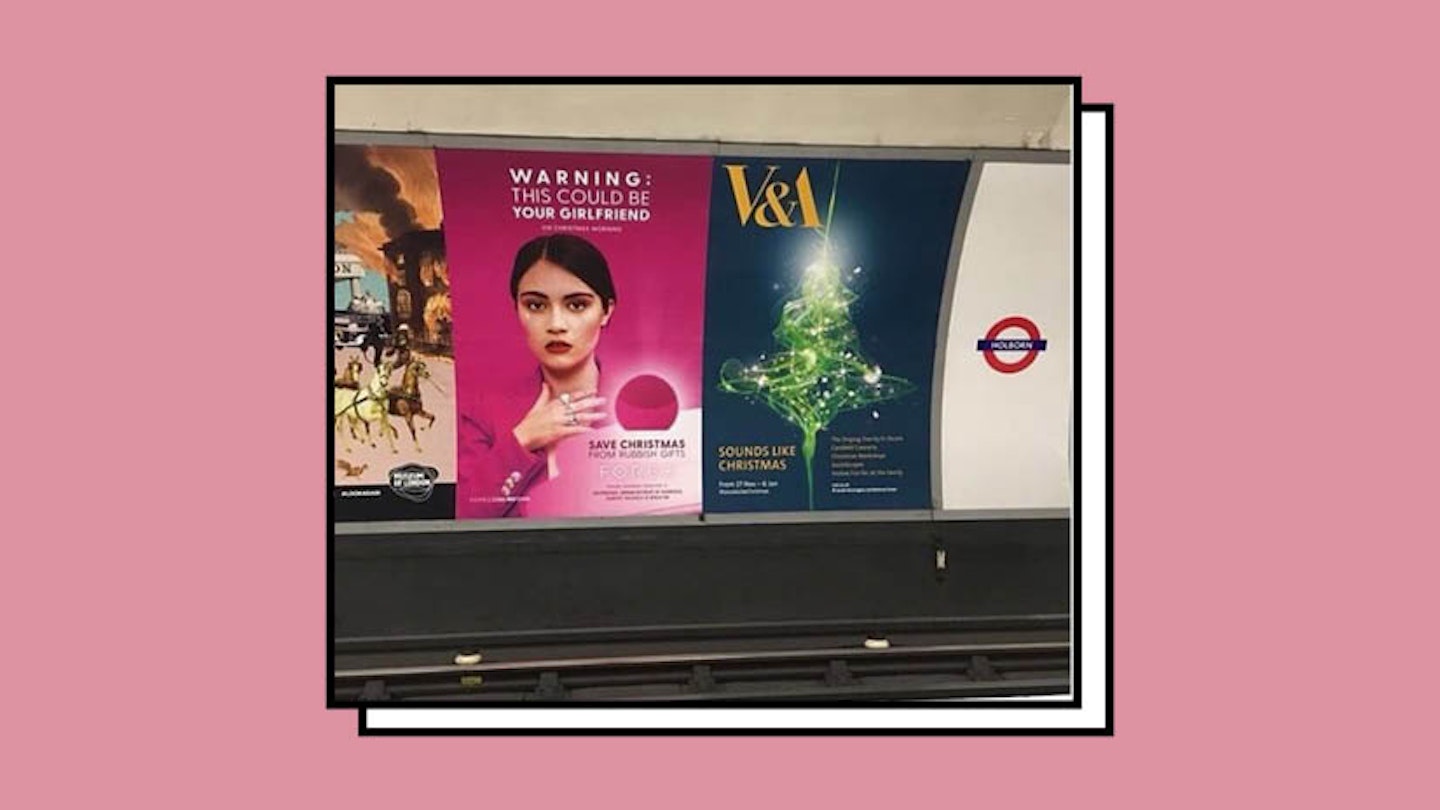Last night, this London tube advert cropped up in more than one person’s Instagram stories on my feed for all the wrong reasons. The poster, which is promoting a luxury silicone face brush has fallen into the age-old trap of being a bit sexist.
The advert features the headshot of a woman in full make up looking slightly displeased while a tear rolls down her cheek. Above this image text reads ‘this could be your girlfriend’s face on Christmas morning’, implying that unless a woman is opening her presents to discover this product she won’t possibly be able to be happy.
There’s no doubt this isn’t the most egregious example of advert sexism we’ve ever encountered on the billboard of London’s tube tunnels (remember the time the Co-Op ran an ad urging people to buy their daughters Easter eggs to ‘treat them’ for doing the washing up or, of course, Beach Body Ready) but it is yet another example of advertisers getting it wrong.
The face brush in question is a Foreo. Sold in Selfridges and Boots they retail from 29.00 to 169.00. It’s an expensive piece of kit and, in and of itself, it’s fine. If a woman wants to buy herself one with the money she’s earned and use it on her face then so she should. The problem is that the advert implies several uncomfortable things; initially it can be read as suggesting that a man should give his girlfriend a face brush to make her more beautiful (like the woman in the picture) and then there’s the equally troubling implication that she won’t be happy unless she receives a luxury face cleaner which, in the grand scheme of things, I think we can all agree is right down at the bottom of most women’s lists.
The advert isn’t the same as archaic campaigns suggesting men buy their girlfriends hoovers, washing up gloves or cleaning fluid for Christmas but it’s somewhere in the same ballpark. It implies that all a girl wants for Christmas is to be gifted with the tools to conform to patriarchal beauty norms.
One Instagram user replaced the caption with ‘I don’t need your fucking skincare to look beautiful for a man on Christmas morning’ which pretty much sums up everything that’s wrong with the advert.
Foreo’s Christmas advert may not be making headlines in the way Beach Body Ready did, but it’s hard to stop your heart from sinking when you look at it. Waiting to catch the train to work, everything you need to do and have not quite managed to get done buzzing around in your brain, you see it and feel somehow less. Or, at least, I do.
Why? Because our beauty regimes shouldn’t be something we embark on to make us more appealing to men. I wouldn’t mind if my boyfriend bought me face cream, cleanser, perfume, a luxury face exfoliator or whatever for Christmas but I would feel a little disappointed. I must confess that I’ve never used a Foreo product, it might be brilliant. It might be like one of those metal head massagers that make you tingle all over.
That’s not the point.
The point is that conversations about beauty have slowly been changing and whoever came up with Foreo’s holiday ad has totally missed the point. As Naomi Wolf argues in The Beauty Myth, beauty is the 'last, best belief system that keeps male dominance intact'. Historically, women have been, and still are flogged the idea that we have to be beautiful to be loved, respected, employed and liked. Being beautiful, according to the people selling us this idea, tends to look a certain way: thin, young, smooth-skinned, small featured and smooth silky-haired. We're encouraged to spend as much money as we can to achieve these goals.
Not only does Foreo's add lazily play into this, it reinforces the idea that, like house work, beautification is unpaid emotional labour that women are expected to undertake in order to appeal to and appease men and then, somehow, takes a leap and implies that a woman will be disappointed if she doesn’t receive skin care products from her partner, further reinforcing that narrative. If a woman is sad, as the crying one in the advert is, I'm going to put it out there...buying a ninety quid face brush probably won't make her happy. Pro tip.
Earlier this year, the Advertising Standards Authority, announced that they were extending their existing remit, under which they ban advertising that objectifies women and includes ‘unhealthily thin’ images of young women. In a report, they said they wanted to go further and introduce stronger regulation of gender stereotype ads.
The Foreo Christmas ad perhaps doesn’t fall foul of the ASA’s regulations but, more dangerously, it subtly serves as an example of the pervasive everyday assumptions about women, beauty and gender which we don’t always see until we look again and really think about the ideas and ideals we’re being sold.
If you really want a luxury face brush, you can buy it for yourself and use it for yourself. You don’t need anyone else to buy you the tools to ‘improve’ yourself. You’re fine as you are.
Like this? You might also be interested in:
Follow Vicky on Twitter @Victoria_Spratt
This article originally appeared on The Debrief.
